We have been busy this summer! This is also the reason why we haven’t updated you for quite a while. Apart from some conferences on which we presented first theories, we did active field research twice. In the first two weeks of April, we visited an old industrial mining town in South Wales which we have named “C-Town” for reasons of anonymization. Three months later, we went to Dublin, the capital of the Republic of Ireland. Now the conference season has come to an end and we finally have a chance to process our experiences in this blog. Stay excited!
Dublin: an economic, cultural and social centre
In the midst of summer, we did our third fieldtrip. In order to gain a different impression from the experiences we made in the UK, we travelled to the Republic of Ireland. Here, we focused on the capital city of Dublin, the essential place to learn something about how local people deal with poverty and its problems. Because there is no city in the region that matches with Dublin’s size and structure, we decided not to anonymize its name. The urban quarters and towns, however, will be given a fictitious name.
After our arrival, we first of all tried to find some orientation. Our first impression of Dublin was lively and diverse. People doing their business, stuffed busses, modern offices that have been built rapidly at the old harbour (presumably for the creative and internet industries as well as some banks), a centre full of tourists who look out for the next pub. For our interviews we stayed within two outlying districts. On the one hand, we visited a privately organized, though state-funded job centre for long-term unemployment, where we had “classic” group discussions and single interviews with the unemployed and with the staff members. On the other hand, we went to see a church congregation during which our visit almost seemed to change into an ethnographic fieldtrip.
Job centre for long-term unemployment
The centre, which was founded in 1996, is state funded (1 Mio. € peryear) and deals with long-term unemployment in different parts of Dublin. The idea is to bring people who have been unemployed for a certain amount of time back into the labour market. Especially persons with special needs who raise their children as “single parents” or identify themselves as part of the “traveller community”, seem to represent a special target group for the centre’s activities. In order to participate, you have to be 16 years old. But not everyone who has outgrown their teenage years is allowed to enter. People who are suffering from “substance abuse” are not being welcomed because of the bad influence they might have on the other participants. Interestingly enough, the centre shares its data basis with the institution that is responsible for the official job centres: the Civil Service. As we have been told, this close connection bears the potential of ethical problems that staff members have to face. For instance, the Civil Service requests that it has to be reported when job applicants contravene the agreements made with job centres or training programmes, although such reports of conduct would certainly destabilize the confidence-building between staff members and participants. That is the reason why requests of this kind generally remain unanswered. After we were welcomed kindly and provided with all sorts of information about the centre, we directly got in touch with participants of the JobClub and started a group discussion. Almost a week later, we returned to have single interviews with some of those who attended the group discussion. Unfortunately, another group discussion that was dated for the day preceding our departure could not be realized.
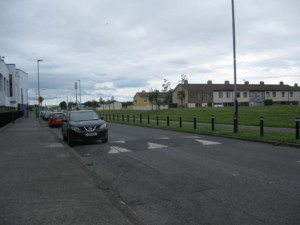
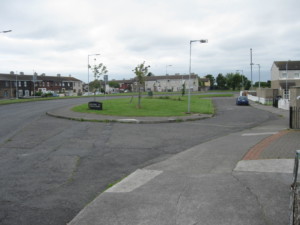
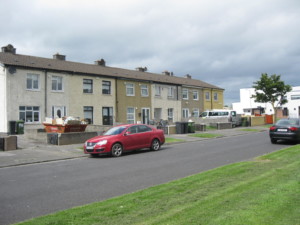
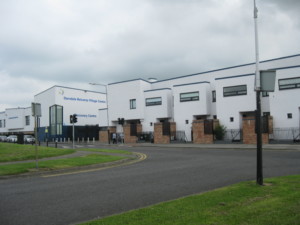
Church and Traveller Community
The second part of our fieldtrip took place in a part of Dublin that is known as a disreputable area due to its high crime rate. Here, we visited the centre of a church community, which is located next to a church, a school and a medical institution. The cherish priest, together with one of the nuns, was of great help to us when it came to further contact-making in the field. Accordingly, we had the opportunity to hear a wide variety of stories from people during several group discussions and single interviews that were held in the church. It turned out that by far not all of the people who are participating in the church activities offered consider themselves being needy or poor. In fact, some of the people interviewed took it to be an offence when the interview questions indicated the assumption and identification of them being poor. Anyhow, the church organizes an independent foodbank that is open throughout the whole day, serving tea and sandwiches. The foodbank is directly addressed to those in need and is used frequently.
Furthermore, the nun took us to the edge of the local area where we had the chance to be introduced to the traveller community that has become part of the neighbourhood by now. The Irish Travellers are a nomadic, driving people, spread around Europe, but mostly living on the island. Because of their traditional way of living, they are being discriminated and have to exist under bad conditions. On top of that, they are considered as being uncommunicative and avoiding outward contact. Without the help of the nun, we probably would not have been able to get in touch with this community.
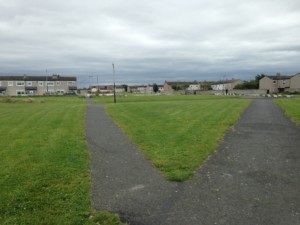
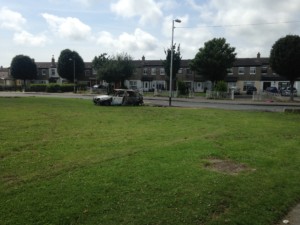
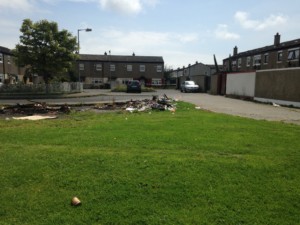
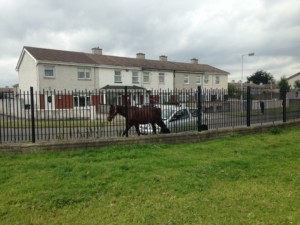
On the way to the traveller site, we gained a first impression of their living environment. In contrast to the area on the other side of the church, the streets, houses and estates seemed far less taken care of. The roads were covered in garbage so that it evoked the thought of walking through a landfill. We also saw a broken car burning in a street corner that was removed on the next day but left behind strong burn marks on the ground. It became clear to us that deviant behaviour is more common here that at the other end of the city. The nun, however, did not seem visibly impressed by the environment. Instead, she gave us some pre-information about the traveller site we were going to visit. On our way, we saw some passengers greeting the nun. Especially the children appeared to be close to her. While approaching the traveller site, grazing horses and ponies attracted our attention.
At the moment that we reached the site, we were fascinated. It surely looked a bit chaotic, but not repellent. Like all the people that we had met before, the travellers were really friendly and talkative – at least the women. Even though travellers are said to be reserved (which they actually say about themselves), we had some extensive conversations. This part of our field research transpired to be more of an ethnographic manner than the other contact points that we visited. Visiting the traveller community opened up a new “Sinnprovinz” (= “province of meaning”) of our research that we had not taken into consideration previously. While visiting two other traveller sites, we gained a solid impression of the reality experienced by the traveller minority. Especially, exclusion and relative poverty are shaping conditions in this context. The last site that we visited was a real eye-opener in this respect.
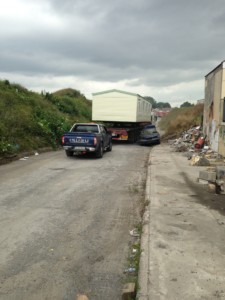
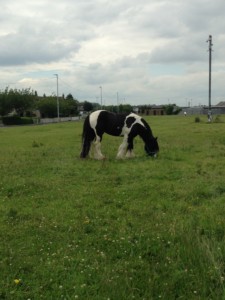
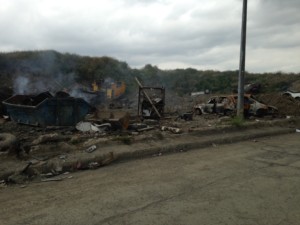
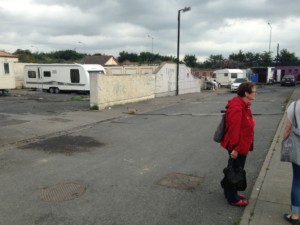
When visiting the traveller community, we got into some interesting conversations with a young woman who invited us to her caravan a couple of times and explained us more about the lifestyle of her minority. Here again, we experienced an enormous hospitality and openness. Because we had not designed a well-structured preparation for these particular conversations in advance, the notes have to be used as ethnographic documents.
Short trip to the interior of the island
Before the time of departure came, we spent one more fieldtrip-day away from Dublin. Approximately one hour away from the socioeconomic centre, we hoped for an enlargement of our data basis. In a privately organised institution, we met a group that was just about to end a self-employment course. The participants all seemed content, open and friendly. Here, we had the chance to enter into a lengthy and productive group discussion, as well as further talks with some of the staff members about their working experiences. All in all, we got the impression that with this day-visit we discovered another important variation of poverty and a different form of welfare state administration.
Translation: Charlotte Nate
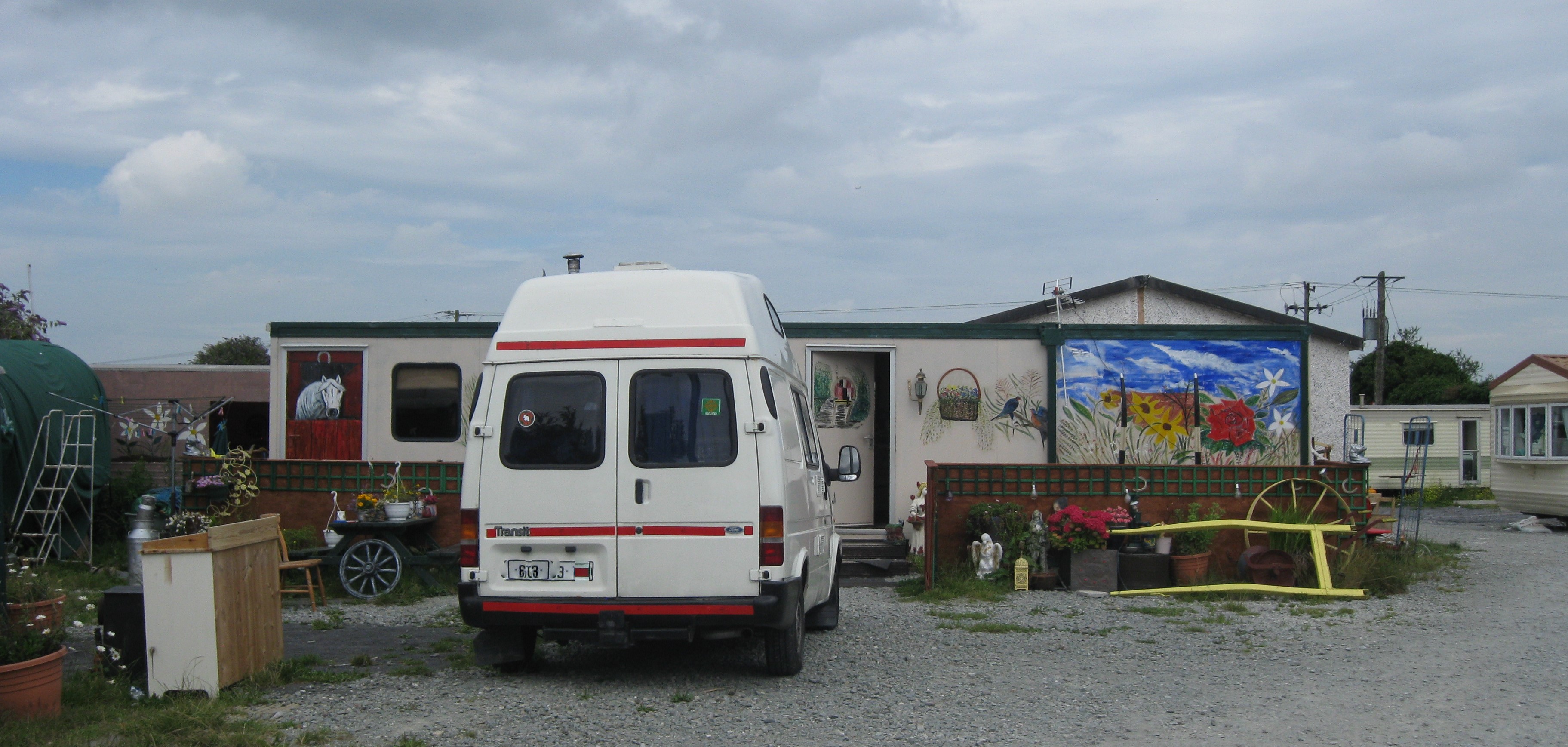
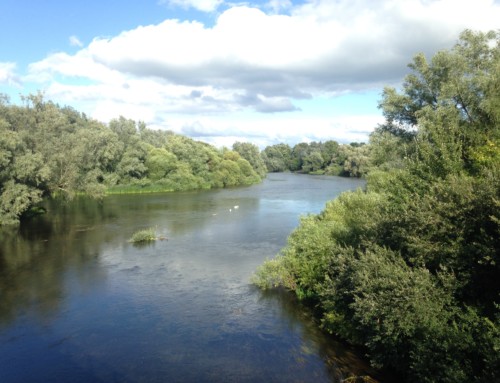
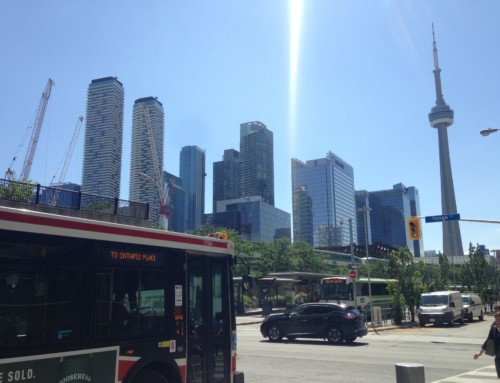
Leave A Comment